Discovering the origins of human flight is a journey through history, innovation, and the relentless pursuit of conquering the skies. The question of who invented the airplane and when is pivotal in understanding the evolution of aviation.
Wright Brothers: Pioneers of Flight
The Wright Brothers, Orville and Wilbur Wright, are widely credited with inventing and building the world’s first successful airplane. In December 1903, they achieved the historic feat of sustained, controlled flight in Kitty Hawk, North Carolina, United States.
December 17, 1903: A Momentous Day
On that fateful day, the Wright Flyer, a biplane with a wingspan of 12.3 meters and a weight of 274 kilograms, took flight, marking a monumental leap in human achievement. Orville Wright piloted the aircraft for 12 seconds, covering a distance of 36.5 meters. This groundbreaking event forever changed the course of transportation and technology.
Predecessors in Flight
While the Wright Brothers’ accomplishment is legendary, it’s essential to acknowledge the contributions of earlier aviation pioneers. Individuals such as Sir George Cayley, who conceptualized the principles of modern aeronautics, and Otto Lilienthal, who made significant advancements in glider technology, laid the groundwork for powered flight.
Langley’s Aerodrome
Prior to the Wright Brothers’ success, Samuel Pierpont Langley, an American astronomer and aviation enthusiast, made notable attempts at powered flight with his Aerodrome aircraft. However, his endeavors faced challenges, and his machines failed to achieve sustained flight.
Controversy and Recognition
The question of who deserves credit for inventing the airplane has sparked debate and controversy over the years. While the Wright Brothers’ achievement is undisputed, there have been claims and disputes from various quarters, each asserting their contributions to aviation history.
Legal Battles and Patent Wars
Following their historic flight, the Wright Brothers engaged in legal battles to protect their patents and assert their claim as the inventors of the airplane. These disputes, though contentious, underscored the significance of their achievement and the fierce competition in the burgeoning field of aviation.
Legacy of Innovation
The legacy of the Wright Brothers endures through their pioneering spirit and relentless pursuit of innovation. Their historic flight not only revolutionized transportation but also inspired generations of aviators, engineers, and dreamers to reach for the skies.
Advancements in Aviation
Since the Wright Brothers’ first flight, aviation has undergone remarkable advancements, from the development of faster and more efficient aircraft to the exploration of space travel. Their legacy serves as a testament to the power of human ingenuity and the boundless possibilities of flight.
In conclusion, the invention of the airplane by the Wright Brothers in 1903 represents a defining moment in human history. Their pioneering spirit, ingenuity, and determination paved the way for the age of aviation, forever changing the way we travel and explore the world.
Frequently Asked Questions
Here are some commonly asked questions about the invention of the airplane:
| Question | Answer |
|---|---|
| Who were the Wright Brothers? | The Wright Brothers, Orville and Wilbur Wright, are credited with inventing and building the world’s first successful airplane. |
| When did the Wright Brothers achieve sustained, controlled flight? | The Wright Brothers achieved this feat on December 17, 1903, in Kitty Hawk, North Carolina, United States. |
| What were some predecessors in flight? | Before the Wright Brothers, individuals such as Sir George Cayley and Otto Lilienthal made significant contributions to aviation. |
| What legal challenges did the Wright Brothers face? | Following their historic flight, the Wright Brothers engaged in legal battles to protect their patents and assert their claim as the inventors of the airplane. |
| How did the legacy of the Wright Brothers impact aviation? | The legacy of the Wright Brothers continues to inspire advancements in aviation and serves as a testament to human ingenuity. |
Modern Aviation Innovations
Today, aviation continues to evolve with advancements in electric propulsion, autonomous flight technologies, and sustainable aviation fuels. These innovations aim to make air travel more efficient, environmentally friendly, and accessible to all.






